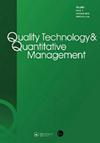Mechanism equivalence analysis for accelerated degradation tests based on tweedie exponential dispersion process
IF 3
2区 工程技术
Q3 ENGINEERING, INDUSTRIAL
Quality Technology and Quantitative Management
Pub Date : 2022-05-18
DOI:10.1080/16843703.2022.2071536
引用次数: 1
Abstract
ABSTRACT Mechanism equivalence analysis, focusing on the underlying quantitative relationship between degradation model parameters under different stress levels when the accelerated failure mechanism remains unchanged, has been developed and adopted widely in accelerated degradation tests (ADTs) over recent years. For a specific degradation process, the mechanism equivalence conditions can be derived based on the acceleration factor invariant principle and further utilized to test whether the accelerated failure mechanism remains unchanged or not under different stress levels. In this paper, a unified form of the mechanism equivalence conditions for commonly-used stochastic process models is derived based on Tweedie exponential dispersion process. The unified form can cover the conditions of Wiener, Gamma and inverse Gaussian processes, etc. Based on this, a complete procedure for mechanism equivalence test of ADT is proposed through the joint application of normality test and parameter hypothesis tests. In this way, the availability of the ADT data can be distinguished before using them for lifetime prediction of products. In addition, the effects caused by degradation model mis-specification and ADT data misuse are further analyzed from the perspective of relative error. A simulation example and two real-world case studies are used to demonstrate the effectiveness of the proposed methods.基于指数离散过程的加速降解试验机理等效分析
摘要:近年来,机构等效分析在加速退化试验中得到了广泛的发展和采用,该分析侧重于在加速失效机制不变的情况下,不同应力水平下退化模型参数之间的潜在定量关系。对于特定的退化过程,可以基于加速因子不变原理推导出机制等效条件,并进一步用于测试加速失效机制在不同应力水平下是否保持不变。本文基于Tweedie指数离散过程,导出了常用随机过程模型的机制等价条件的统一形式。统一形式可以覆盖Wiener、Gamma和逆高斯过程等条件。在此基础上,通过正态性检验和参数假设检验的联合应用,提出了ADT机构等效性检验的完整程序。通过这种方式,在将ADT数据用于产品寿命预测之前,可以区分其可用性。此外,从相对误差的角度进一步分析了退化模型不规范和ADT数据误用造成的影响。通过一个仿真实例和两个真实世界的案例研究来证明所提出方法的有效性。
本文章由计算机程序翻译,如有差异,请以英文原文为准。
求助全文
约1分钟内获得全文
求助全文
来源期刊

Quality Technology and Quantitative Management
ENGINEERING, INDUSTRIAL-OPERATIONS RESEARCH & MANAGEMENT SCIENCE
CiteScore
5.10
自引率
21.40%
发文量
47
审稿时长
>12 weeks
期刊介绍:
Quality Technology and Quantitative Management is an international refereed journal publishing original work in quality, reliability, queuing service systems, applied statistics (including methodology, data analysis, simulation), and their applications in business and industrial management. The journal publishes both theoretical and applied research articles using statistical methods or presenting new results, which solve or have the potential to solve real-world management problems.
 求助内容:
求助内容: 应助结果提醒方式:
应助结果提醒方式:


